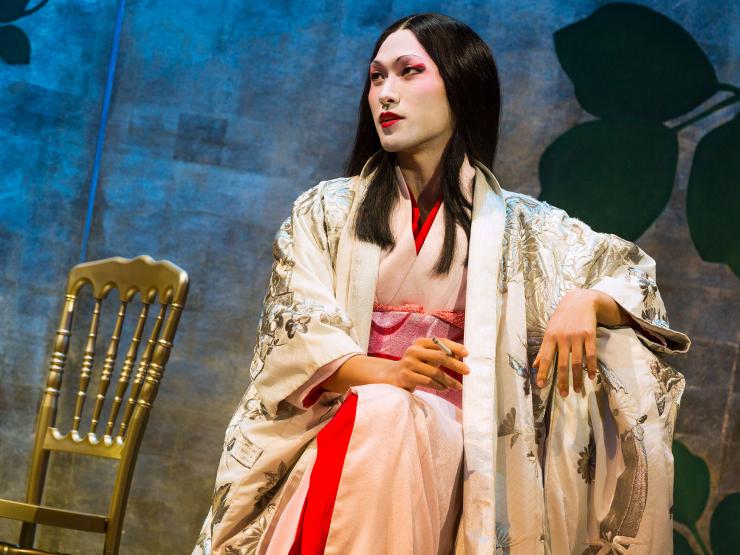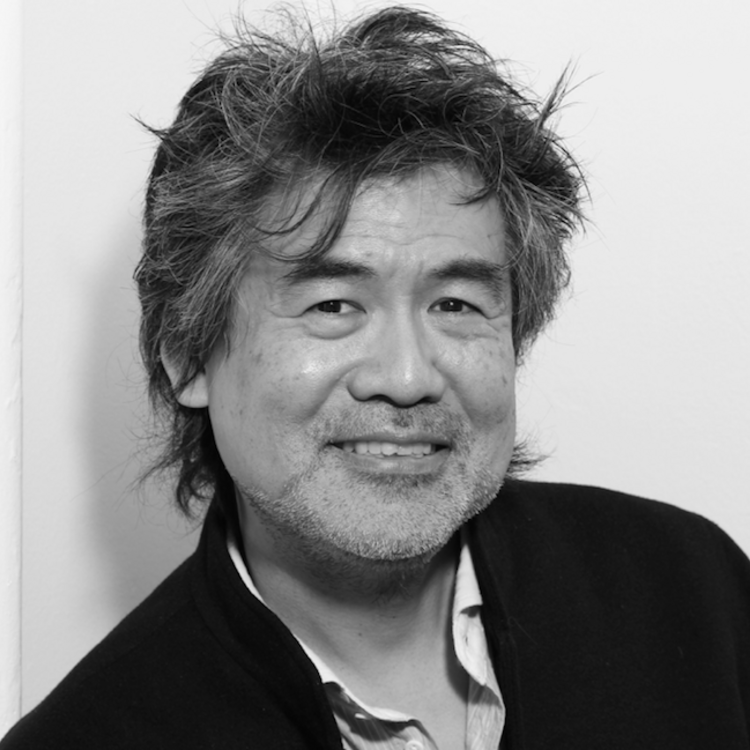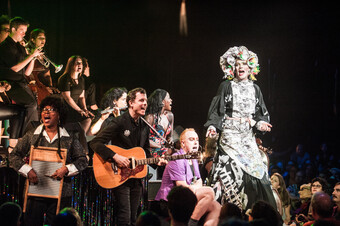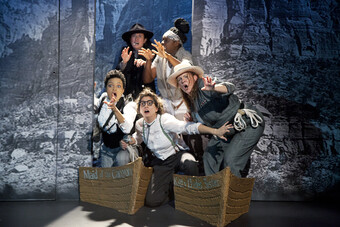M. Butterfly from 1988 to 2017
An Interview with David Henry Hwang
David Henry Hwang’s Tony Award-winning play M. Butterfly broke ground when it premiered in 1988, bringing gender nonconformity to the stage in new and surprising ways. But in the thirty years since the original production, a wealth of new information has been discovered about the lives of Bernard Boursicot and Shi Pei Pu, the real-life French diplomat and Chinese spy whose affair inspired M. Butterfly. Moreover, the infamous climax of the play no longer felt surprising as other narratives of gender confusion played out on stage and screen. To give M. Butterfly new life, David chose to rework the script for the Broadway production currently playing at the Cort Theatre. Shock and awe at the revelation of Song’s biological sex were exchanged for a more contemporary exploration of gender fluidity. I sat down with David to discuss his revision process.
The following interview contains spoilers for both the 1988 version of M. Butterfly and the 2017 production.
Jen Gushue: Did you choose to revise M. Butterfly because of the revival, or did you set out to revise it and then the opportunity for production came along? Which came first, the chicken or the egg?
David Henry Hwang: This rewrite came about as a result of having a production. In retrospect, I was not in a hurry to revive M. Butterfly. It’s been thirty years, and I’ve had other opportunities to revive the play that I’ve passed on. It turns out, I was waiting for a way to engage the material again in a way that made it feel fresh. I hoped it would engage with the culture in a similar way that it did thirty years ago. I knew that would involve having a bold new approach to the production, and I came to realize that I also wanted to look at the text again.
Jen: This is not the first piece you’ve revised, is that correct?
David: That’s true. I’ve been lucky to get to a stage in my life where some of my early shows are being revived in New York. I was a Resident Playwright at Signature Theatre a few years ago. Of the two older plays we did, I chose to revise one of them—Golden Child—and chose not to touch the other one, The Dance and The Railroad.
I think theatre is a living thing.
Jen: Why is revision something that’s on the table for you? What does it mean for you to be able to revisit something you’re so familiar with and make it new again?
David: I think theatre is a living thing. As an author, there are times when it feels appropriate for me to revisit a script if there are things I still want to explore with that subject or with those characters. There are other times where a piece is pretty much done for me. In the case of The Dance and The Railroad, the one I chose not to revise: that play premiered at The Public when I was twenty-four, and I feel I don’t even know how to write like that anymore. It’s very subjective to determine which works I feel excited about reengaging with. Tony Kushner was visiting my class at Columbia the other week (Tony knows so much more than I do), and he mentioned that there were four versions of Hamlet. Much greater playwrights than I have chosen to return to some of their works later in life.

Jen: Going back to M. Butterfly, I read a while ago that there had been new letters discovered between the two real life parties that the play is based on. How much of the revision was guided by that discovery?
David: There were letters that came to light, but really that was only part of a much larger set of facts and circumstances that have come to be known since I wrote the original play. Ironically, much of it has come to be known as a result of the success of the play. When I wrote the first version, all I really had to go on was one column on page twenty-seven of The New York Times. Since this was pre-Internet, there wasn’t really a way to do any more research, so I essentially made everything up, which worked out quite well. As a result of the success of the play, in kind of a reverse-meta situation, there was a lot of interest in the real people and more detailed information came to light. Barbara Walters went to Paris and did a television special on them; a book was written about them. I offered both Bernard Boursicot, the actual French diplomat, and Shi Pei Pu, the actual Chinese spy, percentages in the play, so when it became successful, Bernard started following productions of M. Butterfly around the world. He’d show up in Bucharest or wherever and say, “Oh, I’m the real guy.” And people would take him out for drinks.
Jen: As far as all this new information that you discovered after the success of the show, was there anything that you tucked away in your mind for a future revision? Was there a piece of the story that was new to you or missing that you knew you now had to include?
David: No, because I didn’t know that I was necessarily going to revise the show until we started thinking seriously about this particular revival. All the information that had come out about the real-life figures just felt to me like really interesting supplemental material. And a lot of the true stuff did not feel useful to a new version of the play, but there were several things that did feel exciting to get into the new text. But it’s still not a docudrama.
We’re so much more aware of nonconforming gender identities and different forms of gender expression now. I wasn’t sure if Song Liling was even a transgender character…
Jen: How did you go about integrating the new material? Did you set out to rewrite from beginning to end or did you pick out different scenes or moments that you wanted to tweak?
David: Julie [Taymor] and I worked quite closely on the revision. We would talk about parts of the real story that seemed stimulating, then I would go away and revise a certain section. It was a process that took about a year. Several months before our first rehearsal, Clive Owen and Jin Ha and our whole cast got together for a twenty-nine-hour workshop over four days to really investigate the script. I did a lot of revisions during that period.
Jen: You mentioned Julie’s role in aiding you in this process. I’m writing this piece for HowlRound and my editor mentioned to me that [former HowlRound director and co-founder] P. Carl had also been a consultant on the revision.
David: Yes, yes, yes! I mean, thirty years ago I didn’t know that the term transgender existed. We’re so much more aware of nonconforming gender identities and different forms of gender expression now. I wasn’t sure if Song Liling was even a transgender character, but I wanted to consult with people who are closer to this experience than me. I wanted to educate myself and Carl was a great help. He was incredibly generous to look at the script and help me understand things that were beyond my own experience.
Jen: If you wouldn’t mind, would you be able to talk about some of the specific changes that you made?
David: We were really trying to bring out Song’s experience of the relationship more fully to balance the Eastern and Western “sides” of the story. It so happened that the actual Chinese spy, Shi Pei Pu, was a Chinese opera performer in the Yunnanese opera in Southern China. One of the roles for which he was famous was in The Butterfly Lovers. In 2017, The Butterfly Lovers is a very well-known story in Chinese culture that has been adapted many times into different forms of Chinese opera. In the early 60’s, the Yunnanese opera was the first to adapt the story. It just seemed like this amazing confluence. We had Madama Butterfly, the Western opera, and we now had the possibility of using a Chinese opera which not only also had “butterfly” in the title, but, by the way, also deals with gender confusion. We were able to incorporate that in in a way that reflects the actual story of Bernard Boursicot and Shi Pei Pu, but then also creates a Chinese theatrical counterpoint to the Western opera of Madama Butterfly. That was a kind of theatrical way to begin to balance Song Liling’s experience of this relationship with Gallimard’s.
Jen: The biggest change I noticed in the script was the choice to have Song present as male at the beginning of the play instead of that being a climactic reveal after much of Song and Gallimard’s relationship had been established. Can you talk about the motivation to make that shift?
David: A lot of the original play turned on the surprise reveal of Song’s physical sex. In that way, it’s similar to a movie that would come out a few years later called The Crying Game. I felt that the surprise wouldn’t feel as surprising anymore. It would feel a little dated to rest that much importance on that particular reveal. Moreover, that reveal felt like a reinforcement of the gender binary in that it wasn’t acknowledging the range of gender identity and expression that we understand today. And in the real story, Shi Pei Pu initially presented as male and then told Boursicot that he was physically female but had been made by his parents to dress up as and impersonate a male. That’s now reflected in the play. So again, you have this great confluence of an actual fact from the story serving the purpose of being more gender fluid and less gender binary than the original play.
Jen: Did that also inform the choice to retool the sexual mechanics of their relationship?
David: Yeah, there’s an attempt to explain how Song “did it,” as it were, which is consistent with some of the research and Shi Pei Pu’s own testimony in France. What I think is interesting here is—number one: the idea that there is this salacious interest in what the mechanics were and we sort of push that further in this version. Number two: ultimately, even when you hear him explain it, you still can’t figure it out. I don’t actually think being more aware of the alleged mechanics really explains it any more clearly. In the final analysis, for me anyway, it’s not about the mechanics. It’s not about the body parts. It’s about a kind of mental romance and fantasy and a world they created together, which doesn’t ultimately have that much to do with how they had sex.
Jen: Do you ever see a future production of M. Butterfly beyond this one where you revise again or are you satisfied?
David: I don’t know! I never imagined I would be revising it this time. I don’t know what’s going to happen in the next ten or twenty years. Is there another major production of M. Butterfly? Am I still around to revise it? I have no idea!











Comments
The article is just the start of the conversation—we want to know what you think about this subject, too! HowlRound is a space for knowledge-sharing, and we welcome spirited, thoughtful, and on-topic dialogue. Find our full comments policy here